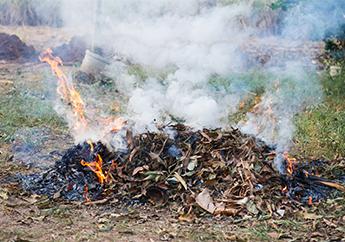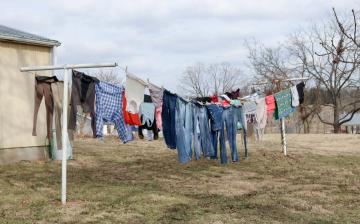
Reduce Vehicle Emissions
One person can make a difference in Missouri's air quality. Reducing the amount of dangerous emissions from vehicles benefits our outdoor air. You can safeguard Missouri's air quality by taking the following steps.
- Drive your car less. Instead of driving every day to work, try carpooling, bicycling, using public transportation or walk, if possible.
- Reduce gas consumption. Plan ahead and consolidate errands and trips to reduce the amount of miles driven. When purchasing a new vehicle, consider vehicles that run efficiently and provide the best gas mileage.
- Keep your car in good repair. Maintain your vehicles emissions control systems. The check engine light may indicate a problem with your vehicles emissions control system resulting in higher emissions and lower performance. Also, be sure to keep your tires inflated to the suggested amount.
- Turn off your engine. An idling vehicle creates air pollution. Turn off your engine while waiting in drive-through lines and especially school or daycare drop-off zones.
- Stop at the click. When filling your vehicle's fuel tank, stop at the click to avoid releasing dangerous fumes.
- Fuel your vehicle in early or late hours. In the heat of the summer, it helps reduce air pollution if vehicles are refueled in the early or late hours of the day rather than mid-day with the temperatures are the highest.
These tips and many others can provide you with additional information.
- What You Can Do to Improve the Air - PUB2199
- Turn Off the Engine. Protect Air Quality. Save Gas and Money. Help Reduce Emissions from Idling Vehicles - PUB2354
- FuelEconomy.Gov - Thinking of buying a new vehicle? Visit fueleconomy.gov to learn more about choosing a more efficient vehicle. The difference between a car that gets 20 MPG and one that gets 30 MPG amounts to $615 per year (assuming 15,000 miles of driving annually and a fuel cost of $2.46).
Don't Burn Trash

Fall is often considered "burn season" because many communities schedule certain time periods to be the time for open burning. Open burning is the burning of any materials in which air contaminants are emitted directly into the air without first passing through a stack or chimney.
Did you know that in addition to posing a fire hazard during times of drought, the open burning of one household's trash releases dangerous pollutants in higher levels than burning the trash of thousands of homes by a municipal waste incinerator? The open burning of certain trade wastes and tires also produces toxic emissions harmful to human health; therefore, the open burning of these types of wastes is strictly prohibited.
Burning trash in barrels and woodstoves creates a low temperature fire. More smoke is produced and more toxic air pollutants are released in low temperature fires. Smoke can cause eye and lung irritation, headaches, dizziness, coughing, wheezing, asthma and even death. Children and older people are more sensitive to air pollution and particles from open burning. Check with your local regulations before burning.
These tips and many others can provide you with additional information.
- Facts on Open Burning Under Missouri Regulations - PUB2047
- What You Can Do to Improve the Air - PUB2199
Use Less Power
Perhaps the most notable way that reducing energy helps the environment is by decreasing power plant emissions. When you consume less power, you reduce the amount of toxic fumes released by power plants, conserve the earth’s natural resources and protect ecosystems. By taking steps to reduce your energy intake, you’ll contribute to a healthier and happier world.

- Maintain your furnace. Replace your home's air filters regularly.
- Use less energy. Choose efficient appliances and heating systems. Raise your thermostat in the summer and lower in the winter.
- Purchase EnergyStar. Look for the Energy Star label when buying appliances and home or office equipment. Visit energystar.gov to learn more.
- Turn the lights off. When leaving the room be sure to turn that switch off. Purchase LED bulbs.
- Air Dry. Air-dry clothing and linens. Use white vinegar in the rinse cycle, reduce the amount of detergent and fluff briefly in the dryer to decrease stiffness.
- Plant and care for trees. Trees filter pollutants and absorb carbon dioxide. Trees also release oxygen into the atmosphere and help cool our homes.
Local Air Quality Initiatives
Missouri has several local planning organizations that have additional resources for improving Air Quality. Check out these programs near you.

